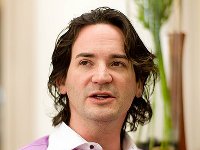 |
| Elon Musk |
Zip2 - When he was twenty-four, he started the company Zip2 with his brother, creating an internet guide for the newspaper industry. Four years later the company was sold to Compaq and Elon made $22 million as a result.
PayPal - Musk started an online finance and payment company called X.com that merged with Confinity a year later. Their main product, PayPal, was the major focus and was acquired by eBay in 2002 - Musk left with $165 million in his pocket.
SpaceX - Elon Musk put $100 million into starting his next company, SpaceX. In 2009, after several failures, the first successful private launch to Earth orbit flew and the company survived. Musk has said that one further launch failure at that point would have finished SpaceX.
But the company is still operating - building and flying ever-better vehicles and selling the flights commercially. A NASA contract to fly cargo to the International Space Station (ISS) has helped support these developments with Dragon, and a crewed version is in the pipeline. The Falcon Heavy rocket is due to make its first test flight in 2015/16, and methane-burning engines for a much larger rocket are under development.
SpaceX is currently valued at about $10 billion.
Tesla - This company builds electric cars and was founded in 2003, Musk joined the venture as chairman in 2004. Following the financial crisis in 2008, he then became CEO and Product Architect and has steered Tesla into the release of three car models with more in the pipeline, he has also offered to supply power-chains to other car makers and allow them access to Tesla's patent portfolio.
Solar City - The idea was Musk's, but the company was founded and is run by others. However, Elon Musk is the largest shareholder. Solar City installs domestic solar power systems free of charge, recouping the investment by taking a share of the proceeds from selling the power produced over a fixed time period.
Tesla and Solar City are cooperating to use electric vehicle batteries to balance out grid power, storing spare capacity by day and drawing power back at night.
Gigafactory - The Gigafactory, part of Tesla, is intended to turn out large numbers of cheap batteries for use in electric vehicles, for power storage for the grid and for other purposes. The initial goal is to reduce the cost of batteries for Tesla vehicles, and the plant is currently under construction.
Hyperloop - Musk proposed the Hyperloop as a new form of transport infrastructure, initially to link Los Angeles and San Francisco. Partially evacuated tunnels and air suspension would allow pods to travel with little resistance and at higher speeds than aircraft. Third parties are designing pods, while Elon Musk plans to build a five-mile test track.
Satellites - Recently, Elon Musk has proposed repeating SpaceX's rocketry and spacecraft success with cheap and reliable satellite design and production. He plans to create a facility for this in Seattle, and co-operate with Google and others in building large numbers of internet-providing satellites in low Earth orbit. Google has become an investor and partner as part of this process.
Mars Colony - Musk has long-term plans to live and die on Mars. The Mars Colonial Transporter will be designed and built to carry 100 tonnes of cargo to Mars at a time. It would also be capable of carrying 100 passengers. The plans involve creating a self-sustaining colony on the surface of Mars, with a population of at least 80 000.





